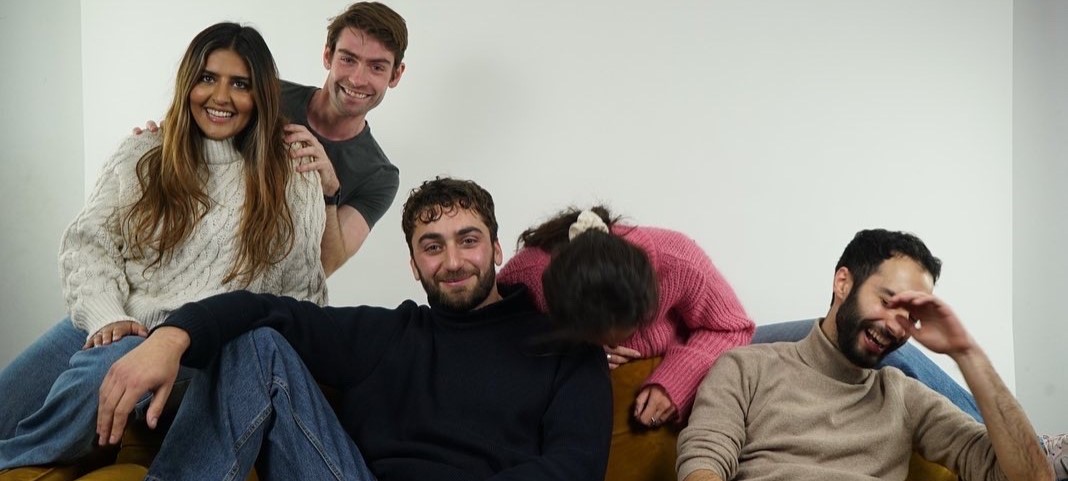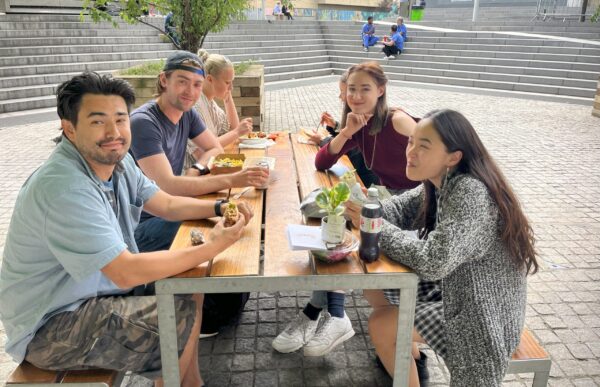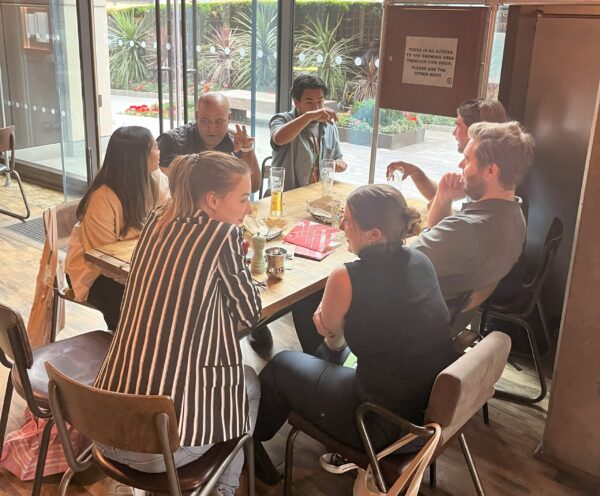What is Kanjo Health
Q: Can you share the background of your company?
A: I’m the CEO and co-founder of Kanjo Health. We pride ourselves on being the first AI-driven mental health app designed specifically for both clinicians and parents. Our main aim is to bridge the gap between clinicians and parents, offering pre-clinical insights into mental health referrals. This then extends to remote monitoring, allowing for a more holistic and effective approach to mental health care.
Why Entrepreneurs First
Q: What made you decide to apply to Entrepreneurs First?
A: I didn’t initially intend to. After running my first company during college, I was in a phase of figuring out my next steps. A random introduction led me to someone who suggested I consider Entrepreneurs First, a program I wasn’t familiar with at the time. The application deadline was only 12 hours away, so on a whim, I applied. To my surprise, they reached out the next morning for an interview. I ended up doing three interviews in one day and received an offer from EF shortly after. It was quite the whirlwind experience, especially because, as a founder, I was more accustomed to being on the other side of the interview table.
Inside Entrepreneurs First
Q: What was the experience like after getting accepted into Entrepreneurs First?
A: It was unique, especially since we were one of the only cohorts during COVID. Before the program officially started, many of us began communicating to get a sense of potential co-founders. This period was like a blend of networking and interviewing each other. Given the constraints of the pandemic, our interactions were virtual, but we were all trying to gauge who would be a good fit, both as business partners and as friends for the upcoming six months. Admittedly, my initial attempts at evaluating potential partners were quite arbitrary, ranking people on various traits and attributes.
Q: How did you find your co-founder during the program?
A: The process is a bit like Love Island. You meet various people and hope to find the right fit. My first co-founder and I explored AI-driven personal trainers, but it didn’t pan out. The second one wasn’t keen on the mental health space. Stefan, my third try, and I connected well. We discussed digital biomarkers, decided to partner up, and achieved a lot in a few weeks. Soon after, we secured an investment from EF.
The Real Benefits of the Program
Q: What did the program offer besides funding?
A: EF provided extensive guidance. There’s a team that teaches what a good founder looks like, how to set and evaluate KPIs, and more. We had access to Entrepreneurs in Residence (EIRs) with domain expertise, who gave weekly advice. Additionally, we learned about pitching, market strategy, and other startup essentials. However, the main benefit was the network of smart peers from diverse fields, fostering collaboration.
My peers were invaluable. EF surrounds you with intelligent individuals from diverse fields. This non-competitive environment, where everyone’s building different companies, allowed for collaboration. If one person succeeded, it didn’t mean another couldn’t. This supportive network became the program’s biggest benefit.
Q: Did you have an “aha moment” during the program?
A: You know, I wish I could say there was this crystal-clear “aha moment” when I knew exactly what I wanted to build. But the truth is, I’ve always been pretty set on working in the mental health space. I think the real eye-openers for me were two-fold.
Firstly, I started to see how digital tools like artificial intelligence could make as much of an impact as traditional education in mental health. That was big for me because I’ve primarily worked on the educational side of things.
Secondly, meeting Stefan was a game-changer. He got me thinking in new ways. But you know what else? I had these flashes of realization, especially when pitching. I was 23, or 24 at the time, surrounded by super smart folks with PhDs from places like Oxford and Harvard. And here I was, a history student turned athlete, feeling like maybe I didn’t belong. But then, bam! I’d nail a pitch and realize, “Hey, I’m actually good at this!”
It was moments like that when I knew I deserved to be there and that I brought something unique to the table. So, in a way, my “aha moments” were more about realizing my own value and that people actually wanted to hear what I had to say.
Kanjo Health Current Status
Q: What’s the current status of the company after the program?
A: We’re doing really well. We’ve gone through some team restructuring, and now we’re operating between London and Abu Dhabi. We’ve even partnered with a government entity in Abu Dhabi called the Early Childhood Authority, which is awesome.
Our focus has expanded to involve multiple stakeholders—from healthcare systems and governments to parents. We’re in the midst of a pivot and it’s a super exciting time. The whole product is getting a revamp. I mean, the first year is all about learning, right? You raise funds, you make mistakes, and you grow.
We’re now a solid team of about five full-time members and we’re gearing up for another fundraising round in November. And on the team front, diversity is key for us. If we’re building a company for diverse families, then our team has to reflect that. Our CTO and co-founder is a mom, for example, which adds a different dimension to our work.
Team building isn’t always easy, but we’ve been proactive about it. We’ve had workshops on hiring, giving feedback, and even had a sort of couples therapy with my co-founder to get to know each other better. At the end of the day, it’s not just about your product or roadmap, but also who you’re building it with. Because let’s be real, if you’re not happy with your team, you’re not going to do your job well.
Q: Have you tested any growth channels recently?
A: Right now, we’re holding off on that because we’re in the middle of a big transition—from being a B2C company to a B2B one. The game has changed, and now it’s more about one-on-one sales. Like, if you land a big contract or partner with a government entity, that’s the focus. It’s a new approach for us, but honestly, I’m way happier in the B2B space.
Don’t get me wrong, I enjoy one-on-one communication a lot. As a founder and especially as a CEO, you’re the ultimate salesperson for your product. You can hire a bunch of sales reps, sure, but at the end of the day, you’ve got to be the closer. You’re the face of your company, and that doesn’t change, at least not until you’re way bigger.
So, while we haven’t explored new growth channels, we’re digging into this new B2B approach. It’s like building meaningful connections one at a time, and that excites me.
Final Advice
Q: Do you have any advice for founders who are considering applying to EF?
A: Oh, where to start? So, there are two main things EF is looking for: founder behavior and founder ability. Behavior is all about traits—like, are you open to feedback and quick to adapt? Can you pivot when a customer says no? Then there’s founder ability. Are you willing to go the extra mile to nail that amazing hire? Do you deeply understand your space? EF often asks, “What’s your right to win in this space?” It could be your expertise or just that you’re an amazing executor.
But what I’ve learned is there’s no “one type” of founder. You’d think it’s all tech bros talking about AI, but nah. Some of the best founders have diverse backgrounds and got into EF for different reasons than I did. Like during my EF interview, I didn’t just talk about my last product. I talked about how I negotiated scholarships at different universities. So what I’m saying is, ditch any stereotypes you have about what a founder should be.
Lastly, you’ve got to be open to uncertainty. You’re going in pre-idea, pre-product, pre-team. It’s like jumping into a vacuum. But once you’re in, you’re supported, which makes a world of difference. Trust me, you want to go on this journey with an open mind. It’s a rollercoaster, but the support system is solid, and it works out in the end.



